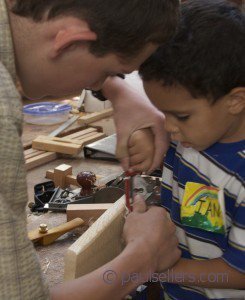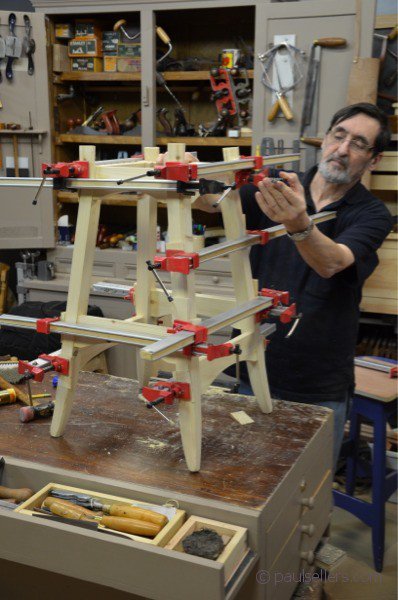Becoming an Artisan
I know from the responses that what I say about becoming a lifestyle woodworker touches a few nerves for whatever reason. I think I most likely understand this more than most. I suppose the word reason is indeed a choice word here because it’s used to somehow justify not becoming a woodworker rather than becoming one. “It stands to reason…”. “Give me one good reason…”. “It’s not a good enough reason…” and so on and so on.


I never plan to step on toes in any of my blogs and I know people who if anyone says “No” to them they immediately respond with opposition even if they have no real reason at all to do so, but that’s not what I do at all. Most often I share from my life experience as a lifetime lifestyle woodworker who has indeed started several businesses that always provided for a largish family on a single-income wage. When someone said thick ironed heavy planes stopped the problem of plane chatter I spoke the truth and said thin ironed planes never chattered. At first it caused conflict but now thousands upon thousands of lightweight #4 Record and Stanley planes have been retrieved, restored and rescued from cellars and attics on five continents.

With the blog on dealing with customers I wanted to introduce the concept that many craftspeople labour under false impressions. It occurs when they fear losing a sale most. This then undervalues their own evaluation of self worth and also the worth of what they make. Mostly of course the real problem is being under the false and misguided impression that for some reason they have to reduce prices to people who are often arrogant in thinking they should indeed reduce the price because the would-be customer can afford to buy more than one piece or that they somehow warrant preferential treatment. In some cultures bargaining and bartering is standard but that’s not mine and it has not been mine working equally on two continents for 25 years in each. I have traded my work for the work of other craftsmen and women because we liked each others work but that’s always been worth for worth and not to manipulate profit. I once traded $7,000 worth of dental work for a mesquite cabinet to the same value. I have found that people expecting a discount can get quite angry when you don’t meet them part way and some get very offended. This can indeed be wearying. In both cases I don’t give in, but, on the other hand I do have a privilege card. When I do reduce my price it’s only ever because I want to. My reason for wanting to is when someone wants what I have made, knows that they could never afford it and I decide at that point that they would love owning this or that for their home. These are people I might want to meet half way. I think too that there something uniquely special about giving my work away for nothing on the occasions when I can afford to to a good cause, or to a friend, a family member, an auction for charity or someone I want to bless for any good reason or for none.
I understand the reasons people give not to go into business and start on their own, but you know, there comes a point when you do feel competent and you know what you made is good. I was 17 when that happened. I had made six bench stools for a man who drove a Lamborghini and then a Jensen as his second car. He owned a pre-digital age cash register business and needed the stools for his staff to work at their repair benches. I know he could have bought the stools for peanuts elsewhere but he wanted to give me work. I worked on my hands and knees on a concrete floor over three weekends with my knees as the vise to chop sixteen mortise and tenon joints for each of the six stools. He paid me on the day I delivered and we were both happy with the results. It led to more work later.
This was my first ever customer under my own steam. If you use dry and well seasoned wood, the right sizing for the joints and also traditional joints, there is usually little to go wrong. That’s the stool we made on woodworking masterclasses two years ago above. Admittedly I didn’t have a family to support at that time, but there were other obstacles facing me—no vises, no clamps to clamp the joints, the risk of not getting paid, buying my materials, no real oilstone but a broken chunk of one. It taught me that a craftsman doesn’t wait for ideal circumstances to start their business. I’ve learned something else too.I have made many things I didn’t know I could make and so I did it. I recall when someone asked me why I had made a cello as my first bowed instrument. I told the violinmaker this; “I didn’t know we couldn’t do it so we did it.” Joseph still plays the cello today, nine years later.
If you want to become a lifestyle woodworker there is nothing to stop you. It might happen overnight and it might take a few years, but there is one thing you don’t want is to live an unfulfilled life. Dreams do cost you, but once you climb over your fears and doubts it’s a wonderful thing to enter the fray and become something you only ever dreamed of becoming.



As Joesph Campbell said “Follow your bliss!” When I was teaching college I would talk to the students asking for advice. I told them to get a degree in what they wanted. I also would advise poor folks to get a degree in a skill they liked and get out and get experience. Then come back for your academics. I know folks who are smart and hard working, who have done well with a 2 year engineering degree.
I believe you are saying “Love what you do.” The rest will follow.
I wanted to help folks and chose the low ground in pay for services. A helping profession.
My other passion is wood. it’s smell, feel, and strength as I stand under an Oak when I lived in Arkansas or my walnut and Maple trees here in Minnesota. I am choosing my alternate life style of woodworking for the rest of my life.
“Good Lord willin, and the creek don’t rise!”
Your words and examples of living are inspiring.
sometimes that climb can seen insurmountable,but its one i look forward to conquering
It’s always interesting when you write about your early years in woodworking.
i wish you would talk more about a portfolio and how one would go about putting there work out there .
I would like to say thank you for your wonderful articles. I have just recently started following your posts and videos and enjoy them very much. I also agree with you whole heartedly about the craftsperson setting the price and not the customer. Does Ikea let the customer’s negotiate there prices. Give people something worth paying for and they will pay its worth. Please keep up the inspirational work.
Mr. Sellers, Thank you for writing this article. While you may be bombarded by a lot of naysayers, there are more individuals like myself who are encouraged by your blog posts. Any advice on how to get over the “Fear Factor” (Fear of making a mistake)? As a beginner in the traditional woodworking world, I find that the fear factor is the constant and unfortunate companion during many of my projects. The naysayers and critics do us (beginners) no favors.
Any advice you have is always appreciated. Thanks for all your posts and videos.
Warmest regards, Thomas
Hi Thomas – While I am not a professional woodworker (I’m a graphic designer) I have had to face the fear of making mistakes, not knowing how to design something or how to fulfil a brief for much of my career. I would say there are a couple ways to overcome the fear you’re talking about.
1. The first and foremost is to remember that what you are producing does not have to be absolutely perfect. Perfection is the enemy of good. It is better to ‘have a go’ and get it 90% right. It’s the mistakes that you learn from. No one creates perfect joints the first time they cut them. Practice is key, and practice in the area’s that you’re most concerned about, putting action directly into the area that you fear is the best way to counter it.
2. Pretty much anything that you are facing has been done before, looking around for examples of other peoples work and how they solved problems will give you a larger pool of design ideas and inspiration to overcome potential problems.
3. Design and making rarely happens in a vacuum. Use the likes of this forum to ask others how to do specific things, you’ll often get a bunch of answers some helpful, some not but ultimately you’ll have more ideas to work with than not. You can shortcut the filtering process of having to separate the good from bad advice (or misinformation as Paul likes to call it) by talking directly to someone who knows what they’re talking about. I’ve been very fortunate to work with good graphic designers – but I had to put myself in front of them first.
Dear Mr. Sellers,
Thank you so much for what you are doing for woodworking. I am not just talking about the furniture you make, but much more about the many, many people you inspire and touch with your actions.
I’ve spent most of my life working for others, and I can say there has been little joy in watching the work I took so much pride and satisfaction in being picked apart by unappreciative customers for the sole reason of getting a discount. It hasn’t been particularly enjoyable working for the vast majority of employers either… though I have had some wonderful employers as well.
I can honestly say that I have learned just as much from the worst of men about what NOT to become as I have from the best of men about what is right.
I only recently came across you and your work, and you have already touched me to my core. Your words echo what I have always found to be true through my experiences, and are reminding me what I have to focus on while I struggle through beginning my life in a new country where I cannot yet speak the language.
Thank you,
Michael
Dear Mr. Sellers,
I know this is an old post but, given the content, I thought it was most fitting to comment here. Thank you so much for working so hard to spread the joy of woodworking to all man people as possible.
I knew I wanted to become a woodworker, using traditional handtools. However, I found that in public forums and publications alike, everything was about having the best and most tools and accessories available. The staggering amount of complex workbench designs was just confusing. With my small budget and lack of experience, this was all very daunting and sapped my confidence. I spent more time “tuning up” tools than using them! Then, due to personal circumstances, I was unable to use those tools I worked so hard on.
Thanks to your example, that’s changed. I am dusting off those tools to put into service. I’ll derust, oil, and wax as needed, of course, but the point is to get woodworking ASAP. If I run into problems, then I will a look at adjusting it—but that will be secondary to working wood.
Thank you for making the woodworking community about working wood again.